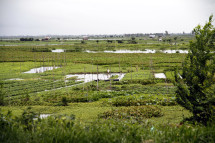Bittersweet Harvest A human rights impact assessment of the EU's Everything But Arms Initiative in Cambodia
Regiones
A European Union (EU) trade initiative intended to reduce poverty in the world’s poorest countries has driven thousands of Cambodian farming families into destitution and led to serious human rights violations. This report assesses the human rights impacts of the EU’s ‘Everything But Arms’ (EBA) trade scheme in Cambodia.

Descargas
Autores
The European Commission adopted the EBA initiative in March 2001, granting preferential access to the European market for all products except arms and ammunitions from all countries classified by the United Nations as ‘least developed’.
While the EBA scheme is intended to benefit the poor through job creation from export-led growth, the case of Cambodia’s rapidly expanding sugar industry tells a different story. In recent years, there has been a surge in forced displacement of rural and indigenous communities resulting from large-scale land concessions for agro-industrial development. Sugar companies, which invested in Cambodia to take advantage of the lucrative European trade preferences, have been among the worst offenders.
Against this backdrop, Equitable Cambodia and Inclusive Development International, in conjunction with the Hands off the Land Alliance, conducted an independent human rights impact assessment of the EBA initiative in Cambodia, focusing on the sugar sector. The assessment is based on interviews with over 275 people, including local officials, human rights workers, community leaders, and smallholder farmers from Koh Kong, Kampong Speu and Oddar Meanchey provinces who have been impacted by EBA-driven industrial sugar development.
The assessment finds that, in the absence of effective human rights safeguards, Cambodia’s policy of granting large-scale land concessions to private investors for agro-industrial development and the EU’s policy of granting preferential tariffs to spur such investment in least developed countries both carry risks of devastating human rights impacts. These risks have materialized in forced evictions and land seizures that have been part and parcel of the development of Cambodia’s sugar industry.
Police and state security forces have carried out arbitrary arrests and detentions and used physical violence at the behest of sugar companies against local communities attempting to defend their land. One community activist was found axe murdered in Koh Kong after documenting and actively protesting the evictions. At least two villages were totally destroyed and more than 11,500 hectares of rice fields and orchards belonging to over 2000 families was seized. Thousands more hectares of community forest and environmentally protected areas were also destroyed to make way for the sugar plantations. Many families suffered the destruction of their crops, livestock and personal possessions. More than 1000 men, women and children were left homeless.
As a result, after the forced evictions, affected people suffered a severe rollback in their enjoyment of basic human rights, including the rights to adequate food, water and housing, as well as the right to work, the right to education and the right to health. In some cases, the evictions led to extreme hunger and possibly starvation. Many of the families who lost their land have had no choice but to work on the sugar plantations, where work is irregular, conditions are poor and pay is generally insufficient to enable most households to make ends meet.
Dispossessed of their means of subsistence, many families have been forced to send their children to work for the sugar companies. The assessment found that child labor was rife on all the plantations. It documented 85 children, some as young as 8 years old, doing often hard and dangerous work on the plantation in Koh Kong province that supplies UK refiner Tate & Lyle Sugars.
The report concludes that preferential market access for producers in the world’s poorest countries could be a positive force for development with human rights if some basic reforms to EBA were enacted. In particular, IDI and Equitable Cambodia recommend that the EU conduct due diligence on all exporters seeking to benefit from the trade preferences to ensure that they uphold core human rights standards.
Press Release: EU's "Everything But Arms" initiative is impoverishing Cambodian farmers.
Picture: Rock Portrait (Flickr)